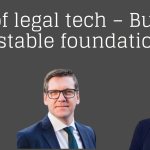So the Janders Dean London #JDHorizons conference went off with a bang last week, providing delegates with a smorgasbord of eclectic talks on change, innovation, transformation, collaboration, growth, reinvention and with enough of a corporate social responsibility element to remind us that many of the issues we face really are first world problems.
Personally my favourite speakers were the first two – honestly – and that is not because I’d tucked into the marmalade martinis after that. Although I obviously did that too.
First up was ridiculously bright Harvard graduate Michele DeStefano, co-founder of LawWithoutWalls.org and professor of law at University of Miami School of Law.
LawWithoutWalls has brought together 2000 people to create innovations that solve problems at the intersection of law, business, and technology but DeStefano was here to talk about the habits of highly effective law firm leadership and entrepreneurialism.
DeStefano, who no-one would have guessed was wearing yesterday’s clothes after her luggage failed to arrive from the United States, asked what the new expectations are of law firm leaders and how they are embracing the challenges facing the industry.
“The legal marketplace is changing,” she told delegates. “How many of you are sick of hearing that lawyers are slow to change and living in the dark ages? It’s simply. not. true.”
DeStefano reminded us that in the in the US there has been an explosion of legal tech startups and a serious influx of money. The delivery of law is increasingly online. Providers are thinking differently about price. And there are changes in how legal services are a) sourced (Dentons is offering legal clinics at WeWork); b) packaged and c) defined, with the likes of US Big Data startup Premonition able to tell you which attorney usually wins before which judges.
“I’m often asked is there a Spotify? Probably not. The sky is not falling yet. Instead we’re seeing the rise of the legal freegan. BigLaw is throwing stuff out and Alt Legal is snapping it up,” said DeStefano.
Driving that change is clients. Here DeStefano showed an image by agile and lean coach Henry Kniberg (below) that shows how to achieve – and not to achieve – iterative and incremental development with clients. It’s about providing clients with what they ask for but understanding their underlying needs. “At law school we’re taught to provide a Maserati, but maybe a scooter would have been better,” DeStefano says.

DeStefano reminded us of the human in all of this, commenting: “Collaboration and problem solving requires empathy and humility.” Which, in case we had forgotten, is not the first trait that you’d identify with successful attorneys. Good luck with changing that bit, then.
Lawyers typically don’t like feedback and tend to be set in their beliefs. “Is tomato a fruit or veg?” DeStefano asked the audience. “People with a growth mindset don’t care, it’s what you can do with the tomato that’s interesting.”
For heads of innovation to provide what clients want there are three innovation gaps. One, they don’t always know what they mean/want in telling you to innovate. “Don’t wait. Take charge of what is meant by innovation,” she said. Two. Lawyers aren’t spending enough time problem solving. “Come along a little undone and spend some time talking to the client,” said DeStefano. “And don’t bill it!”
Lastly is culture and the lack of collegiality, thanks to the structure of the firm as a group of business owners.
DeStefano quoted Clyde & Co’s CIO Chris White, who had told her he “likes to light bonfires” at the firm – “get pockets of people to try something and other people will want to join in and roast a marshmallow or two,” DeStefano said.
The future is, DeStefano, extrapreneurship. It is a word, meaning problem solvers who combine the features of intrapreneurship and entrepreneurship to create solutions.
Look out for DeStefano’s upcoming book ‘Legal Upheaval: A guide to creativity, collaboration and innovation in law.”
The second female speaker who blew me away was Priya Lakhani OBE, founder of data science led education platform Century Tech, who is a natural (depressingly) high achiever, was advising the government on skills education by the time she got to her mid-twenties, and had some astonishing observations about the law firms that she has met through Janders Dean.
Lakhani, who is a gifted speaker, told us that her headmistress refused to sign her UCAS application for university because she had no chance of becoming a lawyer. In the end, it was Lakhani’s father threatening to report the school to BBC Watchdog that turned things around.
She became a libel lawyer but gave that up to launch fresh Asian sauce company Masala Masala, followed by a course at Stamford on AI, after which she looked at how AI is transforming the education sector. Quick answer: it’s not. Lakhani approached former business secretary Vince Cable and former prime minister David Cameron with her Century Tech idea but rather than submit to a lengthy and painful government procurement process, the long and the short of it is they suggested she build it herself. And, of course, she did.
Lakhani has since been introduced by Janders Dean to many law firms to see how they are using AI and says: “The question is no longer about legal tech but any tech: can you keep up with it?”
In a fairly awful indictment of law firms she adds: “Justin sent me to meet lots of firms and I understand machine learning and how to apply it – it’s about innovating and surviving – and all the firms said ‘we’re really innovative and have lots of colourful beanbags and work with millennials. Everyone has innovation in their job title.’”
Worse still she added: “I thought headteachers would be backwards but then I met lawyers.” Ouch.
Reed Smith’s innovation hub manager Alex Smith, who was in the audience, was singled out for praise as one of the few people who really ‘gets it’.
Lakhani said: “In five years time many of your clients won’t exist and revenue will be generated from companies that don’t exist today. Focus on the new companies. My company has raised £4m and is about to raise a further £5m. I have money to spend but how many of you seek me out?”
Lakhani is a proponent of agile methodology and said: “Why when law firms want to do something innovative does it have to be big? Read The Lean Startup about adopting agile methodology – there is no reason you can’t all do that,” adding, “culture eats strategy for breakfast.” It would be a mistake to assume that many law firms are not already applying agile methodology and startups have a teenage tendency to underestimate just how much savvy it takes to reach the bottom lines of many law firms represented in the audience, but I liked her chutzpah.

It was about this point that I had my first marmalade Martini (I believe it’s officially called a ‘breakfast martini’) while watching the ‘The Comic Contract Jam’ sideshow – a large group from different legal backgrounds who were tasked with turning set legal scenarios into comic book images, where possible using superheroes. You wouldn’t think that you could turn “how can a law firm reduce write-offs and leakage to improve revenue collection” into a comic, but they did a good job.
In my favourite presentation, the Solicitors Regulation Authority was depicted as Death Eaters, clients as double-headed monsters, partners as knights on a unicorn with swords, and finance directors as round Minions running around collecting money.
I spoke to the inspiration behind the jam, Comic Contracts founder Rob de Rooy, who set up his business in South Africa in order to help illiterate workers understand what they are signing up to. Comics don’t explain the contract, they are the binding contract. De Rooy told me: “With the explosion in AI and blockchain most people forget that there are a ton of people being left completely behind.”

De Rooy, whose corporate clients include Unilever, at the end of the day addressed the main audience: “If you give your customers terms and conditions in a form they can’t understand you’re not respecting them,” he said. “So a comic is a normal contract where parties are represented by characters and pictures and they sign it.”
There were a ton of other good sessions throughout the day – albeit the feedback said you can have too much of a good thing – and of the ones I saw, my third favourite was Social Selling Expert Alex Low, who some of you will know from his role as client relationship manager at Berwin Leighton Paisner between 2011-14.
The key thrust of Low’s message was that fee-earners need to begin properly playing in the social media spaces where their clients live. “We are buying differently but still selling the way we did 20 years ago,” Low said. LinkedIn profiles are often not up to date. Lawyers have an odd belief that their clients don’t communicate on social media but, using premium tool Sales Navigator Low was able to demonstrate that there are 220,000 general counsel on LinkedIn of which 17,000 have posted something in the last 30 days.
Singled out yet again for being one of the few in the industry to create a brand and “become famous for what they do” was Alex Smith as well as Hogan Lovells’ global head of legal service delivery Stephen Allen, who worked with Low at BLP. “Your personal brand is your window,” said Low. “Drive them to a place where you want them to find out more,” adding, “you need good content; a good story; a good call to action.”
The marketing of #JDHorizons is clever and those who attend (who received a ‘golden ticket’ chocolate bar – or didn’t if the postman ate it) feel privileged to be there, which makes for good networking and for which Janders Dean deserves a round of applause. So does Brian Inkster of Inkster Solicitors who read the golden ticket small print and now has a lifetime pass to JDHorizons for turning up as Willy Wonker.
But it’s the number of female speakers which really jumped out for me.
Janders Dean is a signatory to GenderAvenger, which sees members promise to ensure that women are always part of the dialogue and over 50% of the #JDHorizons speakers were female. It is not an easy thing to achieve in this sector. In fact, speaking frankly, it can be a bloody nightmare, as a result of which we have formed our own diversity initiatives. But Janders Dean nailed it. And hopefully, that means that the women who attended and who read this article will be more likely to put themselves forward for a public speaking role next time the opportunity arises. I challenge you to do so.






